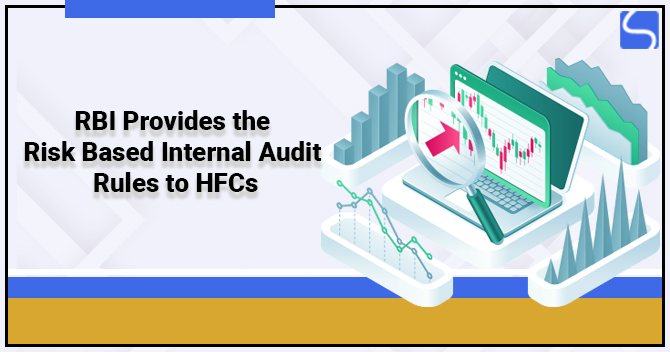RBI Provides the Risk Based Internal Audit Rules to HFCs

Karan Singh | Updated: Jul 07, 2021 | Category: NBFC
The Reserve Bank of India has issued a notification concerning the extension of risk based Internal Audit Rules to all non-deposit taking and deposit-taking Housing Finance Companies with assets not less than rupees 5000 crores with effect from 30th June 2022. In this blog, we shall discuss this notification of RBI (Reserve Bank of India) regarding the Risk Based Internal Audit Rules to Housing Finance Companies.
Table of Contents
Risk Based Internal Audit Rules – Background
On February 03, 2021, the RBI (Reserve Bank of India) has made such rules applicable to other companies. The share price of HFCs (Housing Finance Companies) took a beating after the Reserve Bank of India released the circular concerning extending internal based audit rules to Housing Finance Companies. The share price of the Life Insurance Corporation or LIC Housing Finance fell to a low of Rs. 519 per piece, down 1.5% from the earlier close.
While announcing the risk based internal audit rules for Non-Banking Financial Companies (NBFCs) and urban co-operative banks on February 03, 2021, the Reserve Bank of India stated that the circular is appropriate to the NBFCs (Non-Banking Financial Companies) with an asset size of Rs. 5000 crores & above and all crucial urban co-operative banks with an asset size of rupees 500 crores and above.
Moreover, the Reserve Bank of India said that the circular aims to furnish vital necessities for a robust internal audit function which comprises enough stature, authority, resource, professional capability and independence in order to align such necessities in huge Non-Banking Financial Companies or Urban Co-operative Banks with those that are stipulated for scheduled commercial banks.
The Reserve Bank of India expects that the adoption of risk based internal audit rules by such companies can boost the effectiveness and quality of their internal audit systems.
In the Statement on Development & Regulatory Policies announced as a part of the Monetary Policy Statement dates Dec 04, 2020, the Reserve Bank of India pointed out that appropriate guidelines will be provided to large Urban Co-operative Banks and Non-Banking Financial Companies for the adoption of Risk Based Internal Audit to enhanced the internal audit function, which performs as a third line of protection.
Meaning of Risk Based Internal Audit Rules
The HFCs or Housing Finance Companies must put in place of an RBIA (Risk Based Internal Audit framework by 30th June 2022. Thus what is RBIA? An efficient RBIA is an audit method that connects an organisation overall risk management framework and furnishes an assurance to the directors and senior management on efficiency and quality of an organisation internal control risk management and supremacy concerning systems as well as processes.
What do the New Rules Say?
The new rules of the Reserve Bank of India are vital in the background of increasing cases of financial regulations and governance issues in banks and Non-Banking Financial Companies in past years. In order to make sure an even transition from the existing system of internal audit to Risk Based Internal Audit, the Non-Banking Financial Companies and Urban Co-operative Banks concerned will have to create a committee of senior executives with the task of formulating an appropriate action plan.
The RBI (Reserve Bank of India) said that the committee might deal with transitional & change management problems and should report progress regularly to the board and senior management.
According to the new rules of the Reserve Bank of India, the Non-Banking Financial Companies and Urban Co-operative Banks boards are majorly accountable for overseeing their internal audit uses.
The RBI (Reserve Bank of India) said that the RBIA Policy[1] would be formulated with the approval of boards and disseminated extensively within the organisation. The policy must properly document the authority, purpose and responsibility of the activity of internal audit with a clear separation of the role and expectations from the risk management function and risk-based internal audit function.
Further, the Reserve Bank of India said that the senior management of such companies or firms are accountable for ensuring faithfulness to the risk based internal audit rules approved by the board and the development of an efficient internal control function that measures, identifies, monitors, and reports all risk faced.
Further, it stated that it would ensure that suitable action is taken on the internal audit outcomes within the prescribed timelines and status on the closure of audit reports is placed before the ACB/Board.
Also, the senior management must establish a complete and independent internal audit task must assess and make suitable recommendations to improve the governance process on business risk management and control, decision making, promote suitable values and ethics within the organisation and make sure effective performance management and staff responsibility etc.
The RBI (Reserve Bank of India), in order to make sure effectiveness, said that the internal audit function must have sufficient authority, independence, resources, and stature, thus enabling internal auditors to perform their assignments correctly.
Conclusion
The RBI (Reserve Bank of India) said that all deposit-taking Housing Finance Companies (HFCs), despite their size and the non-deposit taking Housing Finance Companies with an asset size of Rs. 5000 crores and above will come under the Risk Based Internal Audit Rules.
Read our article:The RBI States Maximum Dividend Payout Ratio for NBFCs – An Overview













